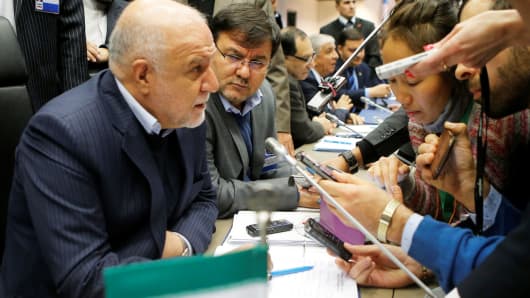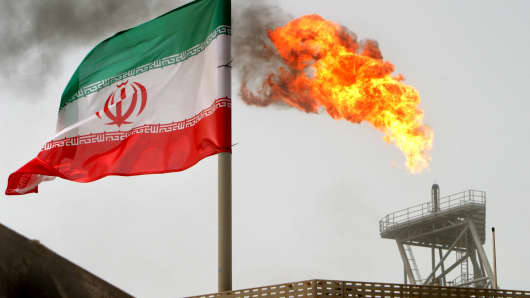CNBC - Elevated geopolitical tension between Saudi Arabia and Iran could soon threaten the unity of an OPEC-led pact to keep oil prices in check, according to one commodity strategist.
"Saudi Arabia-Iran tensions appear to be intensifying. While this provides a geopolitical premium in oil for now, it could develop cracks in OPEC's unity, which could end the pact prematurely," Nitesh Shah, commodities strategist at ETF Securities, said in a research note Tuesday.
Saudi Arabia and Russia have led an ongoing effort by OPEC and other allied oil producers outside the cartel to try to clear a global supply overhang. The output cuts, expected to remain in place until at least the end of 2018, have helped to lift crude prices over the past 12 months.
Saudi Arabia and Iran's 'raging' proxy war
However, the current deal between allied major oil producers could soon be at risk amid heightened tensions over an escalating proxy war between two of OPEC's top three crude producers, Shah said.
"The Saudi proxy war with Iran has been raging for over two years, with little reflection in the price of oil until recently. Unless investors are constantly reminded of the risks, the premia tends to evaporate within a matter of weeks," he added.

Heinz-Peter Bader | Reuters
Iran's Oil Minister Bijan Zanganeh talks to journalists during a meeting of the Organization of the Petroleum Exporting Countries (OPEC) in Vienna, Austria, November 30, 2016.
The ongoing civil war in Yemen is akin to a proxy war between Saudi Arabia and Iran and their competing ideologies of Sunni and Shia Islam, respectively. While Sunni-ruled Saudi Arabia backs the government of President Abdrabbuh Mansour Hadi, its rival Iran backs the pro-Shia Houthi movement loyal to the country's former president Ali Abdullah Saleh.
"While OPEC are doing really well in terms of compliance with their current deal and are likely to provide strong words of support for continuing some sort of an arrangement going into 2019, they will be talking about how to taper down the scale of the support at this May meeting," Shah told CNBC Tuesday.
'Oil prices likely to lose steam in 2018'
The current agreement between OPEC and allied non-OPEC producers to reduce oil output by 1.8 million barrels a day is set to be extended beyond 2018. And while the deal is set to be reviewed in May, multiple OPEC energy ministers have endorsed retaining a relationship that could help prevent another destabilizing collapse in oil prices — like the one that began in mid-2014.
Oil prices have since recovered to above $60 per barrel after crashing down to about $30 at the start of 2016, though Shah projected the recent rally would probably "lose steam for the rest of the year" amid fleeting political risk premia.
[caption id="" align="aligncenter" width="530"] Raheb Homavandi | Reuters A gas flare on an oil production platform in the Soroush oil fields is seen alongside an Iranian flag in the Gulf.[/caption]
Raheb Homavandi | Reuters A gas flare on an oil production platform in the Soroush oil fields is seen alongside an Iranian flag in the Gulf.[/caption]
In late March, Saudi Arabia and Russia were reportedly preparing a move to further their influence over world crude supplies by actively managing markets for potentially the next 20 years. OPEC and Russia were thought to be turning their production-cutting deal into a longer-term relationship in a bid to help fend off the next downturn and make the oil market less volatile. Nonetheless, a 10 to 20-year pact would be an unprecedented move.
Russian Energy Minister Alexander Novak said Tuesday that a joint organization for cooperation between Riyadh and Moscow could be set up once the current deal expired at the end of the year, Reuters reported.

 QR code
QR code